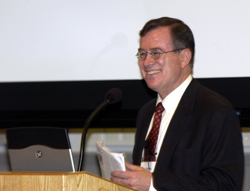 |
| Brady J. Deaton, provost and executive vice-chancellor at the University of Missouri-Columbia |
1:35 p.m., June 6, 2003--Meeting the general education needs of first-year students while adapting to the changing nature of America’s multicultural society was among the issues discussed at the third General Education Institute held June 4-5, in the Multipurpose Room of the Trabant University Center.
The institute, which was attended by approximately 140 University of Delaware faculty and staff, also focused on:
- First-year experience and trends in general education;
- Use of information technology and its effect on
- Students;
- Service-based learning and the relationship between scholarship-based civic engagement and underlying principles of general education;
- Quantitative reasoning to prepare citizens for the sophisticated use of quantitative information; and
- Global citizenship.
Brady J. Deaton, provost and executive vice-chancellor at the University of Missouri-Columbia (MU), delivered the keynote speech.
“When I came to the University of Kentucky as an undergraduate, the first-year experience was more like a freshman survival course,” Deaton said. “The expected rate of freshmen on probation was about 60 percent, and 30 percent ended up out of school.”
This experience, coupled with a two-year hitch as a volunteer teacher with the Peace Corps in Thailand, helped to make Deaton a strong advocate for the evolving movement to change the way colleges approach the first-year education experience.
A successful first-year experience for students, Deaton said, is one where students acculturate to campus life, achieve academic success, develop intellectual curiosity and choose mature pathways to personal growth.
Helping to facilitate these goals at MU are a wide range of living-learning communities, including Freshmen Interest Groups (FIGs). Usually involving about 20 students living in the same residence hall, FIG participants take three classes together and meet once a week for a one-credit freshman proseminar, taught by a FIG peer adviser.
“One of the ways to assist first-year students in making the transition to college life is by making the campus psychologically small,” Deaton said. “We also provide faculty and students who serve as academic role models.”
Since its inception in 1995, the program at MU has grown from 21 groups involving 225 students to 84 groups serving approximately 1,300 students. FIGs have provided students with a strong foundation on which to base their academic careers, Deaton said.
“We have about an 84 percent freshman retention rate,” Deaton said. “Freshmen interest groups have played a key role in that.”
UD’s academic enrichment program for first-year students, LIFE [www.udel.edu/life] (Learning Integrated Freshman Experience) is designed to integrate academic and real-life work experiences by having students live and work together as part of a learning community. LIFE clusters (groups of 16 or fewer students), are co-enrolled in courses organized around certain academic themes and enrichment activities. Students in LIFE clusters at UD live in designated residence halls and are involved in service learning projects, study/discussion groups and a final group-project designed by students.
Although there is a general consensus among educators that general education initiatives have been relatively successful in accomplishing their goals, Deaton said there remains a debate within the academic community about the definition and goals of such programs.
“What we call general education—and how we define it—varies from institution to institution,” Deaton said. “About 60 percent or better of provosts surveyed during the last decade have said that they believe general education is increasing in importance on campus. I believe this is the case.”
While first-year programs like FIG continue their steady growth, many challenges still exist, including the establishment of a multicultural certificate program. Deaton said.
“The world is changing so rapidly that we are challenged by the continual mix of immigrants coming into our country,” Deaton said. “Our campus wants to deal with this, but we need some real conceptual thinking on this issue.”
Besides developing the flexibility needed to meet the educational aspirations of a changing society, other challenges—such as connecting work in arts and sciences with professional studies, securing necessary resources and recruiting faculty with values, experience and commitment—also exist, Deaton said.
“The issue of the response of the institution to societal demands becomes important,” Deaton said. “We need to help students graduate.”
Deaton also said that proper assessment of complex learning goals continues to present a challenge to individual institutions, as well as to national educational organizations.
“We, as institutions of higher education, ought to be out in the front on some of these issues,” Deaton said. “We have the skills, conceptual tools and the statistical and quantitative research framework to make a careful assessment of this.”
Deaton, who joined the faculty of the University of Missouri at Columbia as a professor of agricultural economics in 1989, also served as provost and as deputy chancellor, before becoming provost and executive vice chancellor for academic affairs in 2001.
A graduate of the University of Kentucky, where he earned a bachelor’s degree in agricultural economics and a master’s in diplomacy and international commerce, Deaton received his master’s and doctoral degrees in agricultural economics from the University of Wisconsin.
The author of more than 100 publications, including articles in refereed journals and research publications, Deaton is the author/coauthor of three books, including “Local Infrastructure Investment in Rural America” (1987), with Thomas G. Johnson and Eduardo Segarra; “Food, Nutrition and Agriculture: A Text” (1985), with Laura Jane Harper and Judy A. Driskell and “Local Economic Planning and Management” (1979).
Article by Jerry Rhodes
Photo by Kathy F. Atkinson
|

